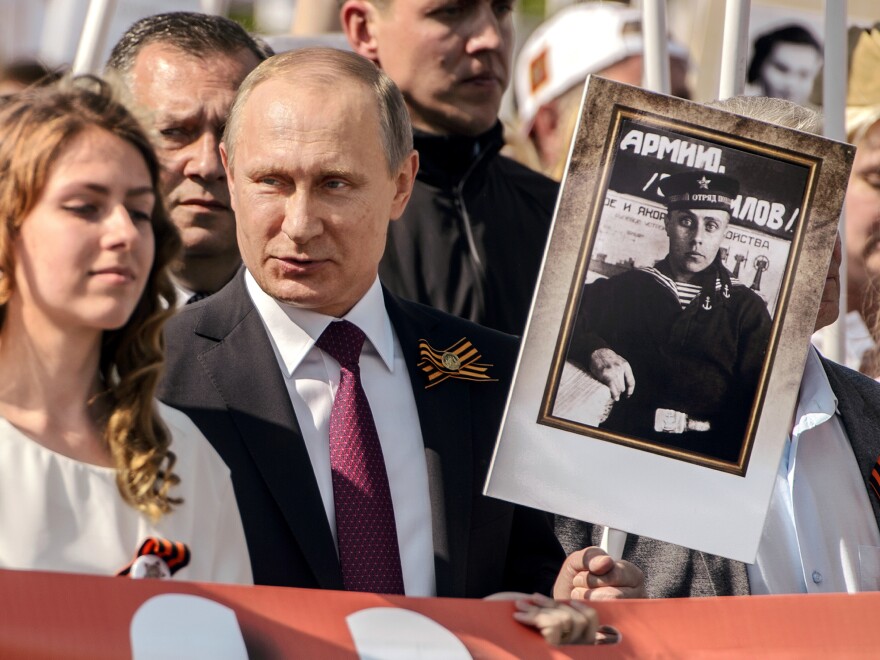Every May 9, Russian television footage is dominated by one of the country's most important holidays, which speaks to both the past and the present.
The programming consists of tanks and other military vehicles rolling through Red Square as President Vladimir Putin and other dignitaries watch. Jet fighters scream overhead, streaming the white, blue and red of the Russian flag in their vapor trails.
It's Victory Day, which this year marks the 71st anniversary of the Soviet Union's victory over Germany in World War II, known in Russia as the "Great Patriotic War."
The ceremony in Red Square is all about the pageantry of military power. Army bands play as the defense minister, Sergei Shoigu, reviews his troops from an open car, greeting each unit with the formula, "Hello, comrades!" and receiving the reply, bellowed from hundreds of throats, "Good morning, Comrade Defense Minister!"
When he congratulates them on that long-ago victory, they reply with a cheer: "Ooh-rah!"
It's largely a made-for-TV production, and Russian television portrays it with dozens of cameras, shooting from every angle, including from right under the marching feet of the soldiers.

Most Russians have to watch it on TV, because tight security makes it difficult to get close to much of the parade route.
Before Putin speaks, there's a momentous trumpet fanfare. When he calls for a moment of silence in memory of the millions who died in the war, the seconds are counted out by a loud tick-tock.
Very old men and a few women, the surviving veterans, sit behind the president, their chests glinting with medals.
If the first part of the ceremony is about the past, the second part is about the modern Russian military. Thousands of soldiers, sailors, airmen and marines march past. This year, for the first time, military women were represented by a unit of female cadets.
Among the more than 100 military vehicles in the parade are Russia's newest weapons, including the Armata tank and the S-400 anti-aircraft missile system.
In a way, this part of the ceremony represents Putin's fulfillment of a promise to modernize the Russian military. The program originally planned to spend hundreds of billions of dollars to bring most of the armed forces up to speed by 2020.
That plan has been slowed somewhat by the drop in oil prices and Russia's current recession, but Putin has vowed that it will go on.
For ordinary Russians, the holiday begins when the televised production is over, and people go out to public parks. Most parks in Moscow have some sort of program to mark the holiday.
In my neighborhood park, the Heritage Garden, there's a stage where a Russian Army chorus belts out nostalgic songs from the war years. Here and there, grandchildren and great-grandchildren lead aged veterans to seats, from which they can enjoy the show. People bring the veterans flowers, especially red carnations, and other gifts.
Whole families turn out decked in Red Army garrison caps and sporting the red-and-black stripes of the St. George's ribbon, which has come to be a symbol of the victory and a sign of support for the current Russian government.
People line up to sample Red Army chow from a smoky field kitchen or try on Soviet greatcoats and helmets to have their photos taken.
Much of this enthusiasm for the military has revived in the past few years. It got a boost with Russia's annexation of Crimea in 2014, and it has been whetted by Russian pride over its military campaign in Syria.
Even with a sagging economy, the Russian government places a premium on stoking Russian patriotism.
Copyright 2021 NPR. To see more, visit https://www.npr.org.



